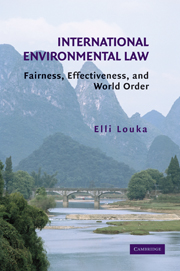Book contents
- Frontmatter
- Contents
- Foreword by W. Michael Reisman
- Abbreviations
- Introduction
- Chapter 1 Introduction to International Environmental Law
- Chapter 2 Foundations of International Environmental Law
- Chapter 3 Compliance and Governance Mechanisms
- Chapter 4 Marine Environment
- Chapter 5 Water Resources
- Chapter 6 Fisheries Resources
- Chapter 7 Biodiversity
- Chapter 8 Air Pollution
- Chapter 9 Trade and Environment
- Chapter 10 Hazardous and Radioactive Wastes
- Chapter 11 Liability and State Responsibility
- International Treaties and Other Instruments
- List of Cases
- Index
Chapter 4 - Marine Environment
Published online by Cambridge University Press: 14 January 2010
- Frontmatter
- Contents
- Foreword by W. Michael Reisman
- Abbreviations
- Introduction
- Chapter 1 Introduction to International Environmental Law
- Chapter 2 Foundations of International Environmental Law
- Chapter 3 Compliance and Governance Mechanisms
- Chapter 4 Marine Environment
- Chapter 5 Water Resources
- Chapter 6 Fisheries Resources
- Chapter 7 Biodiversity
- Chapter 8 Air Pollution
- Chapter 9 Trade and Environment
- Chapter 10 Hazardous and Radioactive Wastes
- Chapter 11 Liability and State Responsibility
- International Treaties and Other Instruments
- List of Cases
- Index
Summary
STATE OF MARINE ENVIRONMENT
Pollution enters the marine environment through dumping, through discharges from the operations of ships, through land-based sources, and through the atmosphere (pollutants end up in the atmosphere from land-based sources). The GESAMP has determined that only 10 percent of marine pollution comes from dumping and 1 percent is a result of sea-bed activities. The main culprit of marine pollution (77 percent) is pollution coming from land-based sources.
Despite the plethora of national and international instruments devoted to the prevention and elimination of sea pollution, the results, in terms of environmental improvement, are mixed. According to a GESAMP study:
Although there have been some notable successes in addressing problems caused by some form of marine pollution, and in improving the quality of certain coastal areas, on a global scale marine environmental degradation has continued and in many places has intensified.
The GESAMP report has placed emphasis on the increasing global problem of eutrophication, that is, the increased biological production in coastal and near shore waters, because of the input of nutrients from sewage and agricultural fertilizers. According to the GESAMP, eutrophication is “among potentially the most damaging of all human influences on the oceans, in terms both of scale and consequences.” The GESAMP has warned that excessive nutrient inputs “can turn marine areas into wastelands.” The GESAMP has determined that sewage is a problem of high priority in all regional seas.
- Type
- Chapter
- Information
- International Environmental LawFairness, Effectiveness, and World Order, pp. 141 - 168Publisher: Cambridge University PressPrint publication year: 2006



